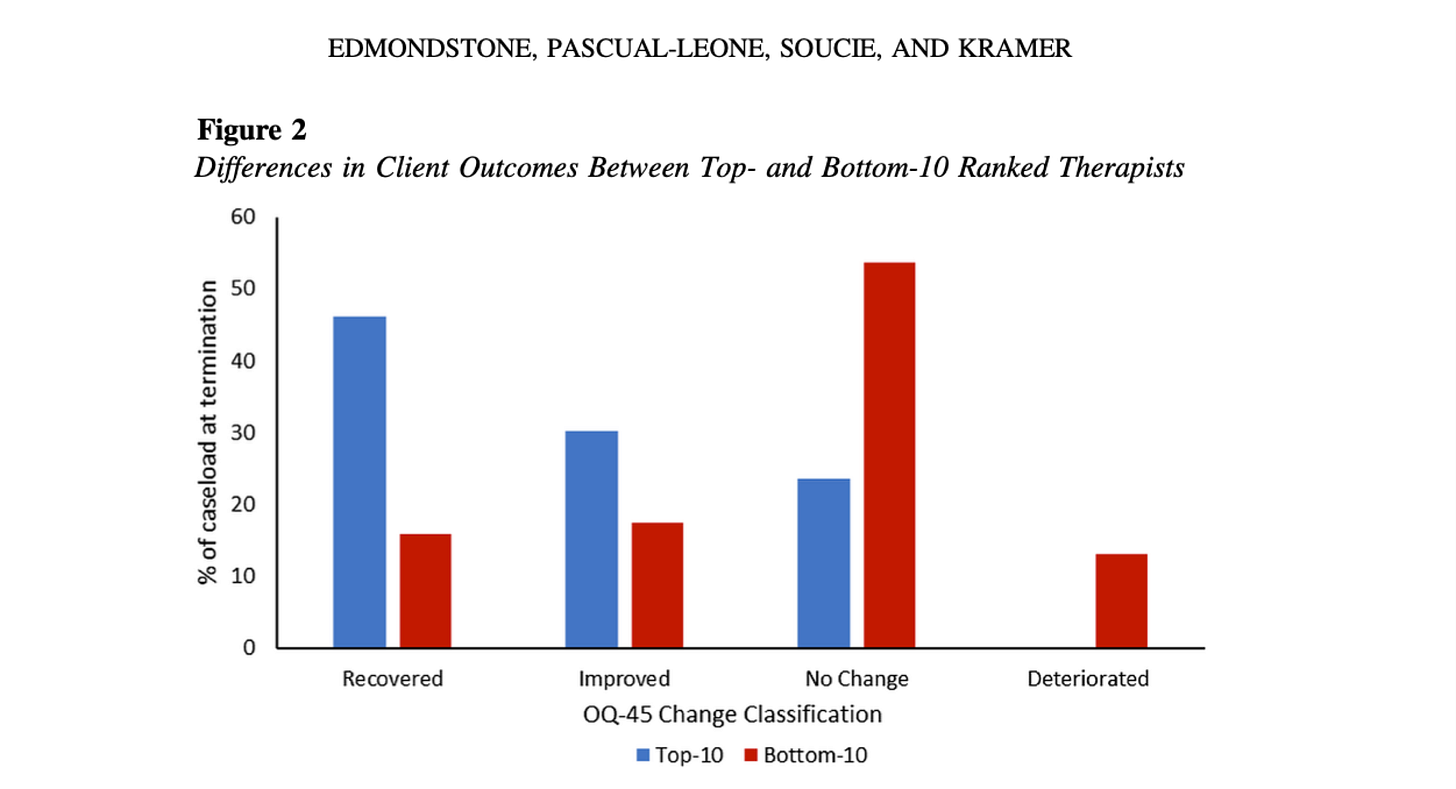Frontiers Friday #149. Become a Guiding Light as a Clinical Supervisor
Why training is failing... and why I'm such a nag regarding the way we conduct clinical supervision.
What are the most pressing problems in the practice of psychotherapy?
There are several issues at hand. For example, it’s a bit of a scandal that, on average, therapists do not get better with experience.1

So what do we do? We invest time, effort and money in getting certified, trained and endorsed in various schools of thought.
However, formal training has little to no impact on actually improving client outcomes.
Let me briefly point out 4 relevant studies that has surfaced in the last couple of years.
First, one prospective study by Tim Anderson and colleagues noted that a trainee’s interpersonal ability influenced results. However, it was their ability measured prior to receiving any training, that predicted actual client outcomes. The 2 years of doctoral training had no significant effect.2
Second, in a recent 2022 study by Chris Edmondstone and colleagues, they took a step further and asked if there were truly differences from the get-go, before training took place?3
Here’s what Edmondstone et al. found:
Differences between therapists exists even before training took place.
Take a look.
Third, David Erekson and colleagues conducted a longitudinal investigation on the impact of psychotherapist training. In essence, there were asking a similar question, “Does training improve client outcome?"4
Here’s what Erekson et al. found:
Therapists were found to achieve the same amount of change on average in their later stages of training
Findings suggest that as therapists progress through formal stages of training, they do not improve in their ability to effect change in their client.
Granted, some do improve with training. But in essence, psychotherapy training does not have a universal effect.
Finally, Jesse Owen and colleagues studied if trainees in the US improved in their clients’ therapy outcomes over time, or, if it is “As good as it gets?”5
Here’s what Owen et al. found:
Trainees improved over time, but only with clients who are less distressed.
There were no change over time when working with more distressed clients.
Take a look.
The Most Pressing Issue
What do we make of these findings?
It’s clearly not because of a lack of trying.
It might not seem like the most pressing issue, but I believe that if we re-imagine how we conduct clinical supervision, we stand a chance to turn things around.
At the heart of our work, it is people passing on to people. This apprentice-model is quite a gift. Many of you reading this are clinical supervisors and you are doing your best to guide other therapists.
You care about this.
This is why one of the first online courses I’ve created back in 2018 was Reigniting Clinical Supervision (RCS). I didn’t want RCS to be like a poor substitute for live training, or a webinar-recording. So I decided to build this course from the ground up, specifically for someone to learn at their own pace, one bite-sized idea at a time, while journeying with a community of like-minded people.

13 cohort of clinical supervisors from around the globe have gone through RCS so far. And the doors are now open for registration for the 14th cohort. (More details below).
Wait, But Why?
Perhaps there are more pressing issues like burnout, lack of clinicians to deliver treatment, access to services and so on. But I would argue if we tweak the way we conduct clinical supervision, this would have a significant ripple on effect.
People passing on to people. Clinical supervisors passing on to therapists, therapists passing on to clients…
But first, our default ways of clinical supervision is not without issues. There are some pitfalls to our default ways of conducting clinical supervision.
More on this below (See #1).
Tapping Into Native Wisdom
Given what we know so far from the four studies we’ve highlighted about the impact of training (or the lack of), as well as the differences that is apparent between therapists from the get-go, instead of hyper-fixating on the “common-core” skills we need to acquire, it behooves us to tap into what each therapist has to offer, and bring that to the table from the very beginning.
Let’s call this native wisdom.6
Native wisdom is located in our prior knowledge, experiences and relational encounters that consist of both edifying and adverse histories.
Educational psychologist David Ausubel said,
If I had to reduce all of educational psychology to just one principle, I would say this. The most important single factor influencing learning is what the learner already knows. Ascertain this and teach him accordingly. (emphasis mine).
This is relevant to clinical supervisors. Our role is to tap into the existing knowledge of each supervisee, and then, help to cultivate this further.
Much like a gardener.
Frontier Friday #149. Become a Guiding Light as a Clinical Supervisor
From the Frontiers Archive: The 7 Mistakes of Clinical Supervision
Interview on Psychotherapy.net: My conversation with Lawrence Rubin on reigniting clinical supervision
- For US practitioners, CE credits available.Blog from Psychotherapy.net: It's Time for Supervisors to Help Clinicians Marry Data with Intuition
From the Frontiers Archive: The Skills of a Supervisor Is Not the Same as a Therapist
⏸️ Words Worth Contemplating:
One man is no man. —Ancient proverb
Reflect:
Are you passing on a guiding light?
Noticeboard:
1-Day Training in Denmark 26th of Oct 2023:
I’m teaching a 3-day supervision course in Copenhagen this October. Thereafter, the organisers are opening up an intimate day-long training in deliberate practice.
If you are interested to join us, you can register here
(Note: The website is in Danish, but the course will be in English. If needed, drop the organiser’s an email. And if it helps, here’s a google translate of the details.)Registration for the 14th Cohort of Reigniting Clinical Supervision is now open!
Who is this for?
Clinical Supervisors who want to create an impact for therapists and their clients.
RCS is specifically designed to help you raise the bar of supervision, so that your positive impact promotes therapist’s development, and ultimately improve their client outcomes.
Start Date: Mon, 25th of Sept 2023
Registration ends: Fri, 22nd of Sept 2023
In gist, RCS comprises of
- 1 bite-sized takeaway,
- every Mondays and Fridays for about 5 months.
- Deep content and community discussions.
- This comes powered packed with lots of bonuses (including one free individual consult), and- Complete access to the course Measured: Feedback Informed Treatment (FIT), worth $485;
50+ VIDEOS, 24/7 Discussion Boards, 180+Days of Content, Community Engagement with Other Supervisors, Individual Follow-Up Consultation.
Fees:
1. $485
or
2. $139, 4-monthly payment.
Note:
The course is a LIFETIME-ACCESS (not a subscription-based).
Feel free to preview some the modules.
(Go to the Course Curriculum section. Alternatively, you can watch this Playlist on youtube)
Special Discount Code:
If you are on the Frontiers list, do use the following exclusive 12% discount promo code: FRONTIERSVIP
If you are residing in a country where your currency is at a significant disadvantage, please drop me an email. If you are interested, I wanna help.
For other practical FAQs regarding the course for clinical supervisors, please see the RCS main page
Warm Welcome to New Folks on Frontiers of Psychotherapist Development (FPD)
If you are new here, I just want to say a big hello to you and would love to hear from you. Tell me a bit about you and where you are from. Drop me an email info@darylchow.com
Click here to see more resources about Frontiers of Psychotherapist Development and Frontiers Friday.
Daryl Chow Ph.D. is the author of The First Kiss, co-author of Better Results, and The Write to Recovery, Creating Impact, and the new book The Field Guide to Better Results .
Two studies: a. Goldberg, S. B., Rousmaniere, T., Miller, S. D., Whipple, J., Nielsen, S. L., Hoyt, W. T., & Wampold, B. E. (2016). Do psychotherapists improve with time and experience? A longitudinal analysis of outcomes in a clinical setting. Journal of Counseling Psychology, 63(1), 1–11. https://doi.org/10.1037/cou0000131
b. Germer, S., Weyrich, V., Bräscher, A.-K., Mütze, K., & Witthöft, M. (2022). Does practice really make perfect? A longitudinal analysis of the relationship between therapist experience and therapy outcome: A replication of Goldberg, Rousmaniere, et al. (2016). Journal of Counseling Psychology. https://doi.org/10.1037/cou0000608
Anderson, T., Crowley, M. E. J., Himawan, L., Holmberg, J. K., & Uhlin, B. D. (2015). Therapist facilitative interpersonal skills and training status: A randomized clinical trial on alliance and outcome. Psychotherapy Research, 1–19. https://doi.org/10.1080/10503307.2015.1049671
Edmondstone, C., Pascual-Leone, A., Soucie, K., & Kramer, U. (2022). Therapist effects on outcome: Meaningful differences exist early in training. Training and Education in Professional Psychology. https://doi.org/10.1037/tep0000402
Erekson, D. M., Janis, R., Bailey, R. J., Cattani, K., & Pedersen, T. R. (2017). A longitudinal investigation of the impact of psychotherapist training: Does training improve client outcomes? Journal of Counseling Psychology, 64(5), 514–524.
Owen, J., Wampold, B. E., Kopta, M., Rousmaniere, T., & Miller, S. D. (2016). As good as it gets? Therapy outcomes of trainees over time. Journal of Counseling Psychology, 63(1), 12–19. https://doi.org/10.1037/cou0000112
I’ve more to say on this topic on native wisdom. Will get to this in another blog.









